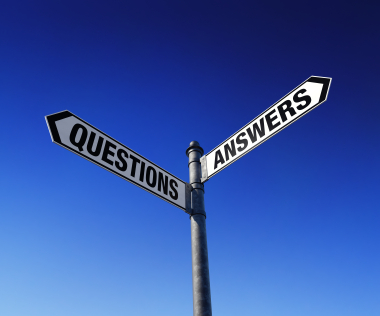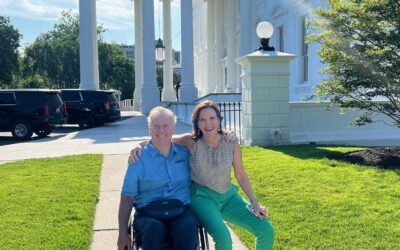 Every time I turn on the TV at the moment I hear fighting about how best to get the US economy back on track. Needless to say, I do not have the answer to that problem. But what I’ve noticed more and more is how steadfast people are in their refusal to ask more questions. Rather that acknowledging how much we don’t know about the best road to economic recovery, people insist that “My way is THE way” and that if you don’t buy into it, you’re an idiot. Something about that approach not only rubs me up the wrong way, but just comes across as incredibly foolish, arrogant and destructive.
Every time I turn on the TV at the moment I hear fighting about how best to get the US economy back on track. Needless to say, I do not have the answer to that problem. But what I’ve noticed more and more is how steadfast people are in their refusal to ask more questions. Rather that acknowledging how much we don’t know about the best road to economic recovery, people insist that “My way is THE way” and that if you don’t buy into it, you’re an idiot. Something about that approach not only rubs me up the wrong way, but just comes across as incredibly foolish, arrogant and destructive.
I have met many clever people over the years… people who have made a lot of money, with more letters after their names than are in mine, with fancy titles and impressive resumes. I have met far fewer truly wise people.
Our society puts tremendous value on cleverness. But having spent considerable time with many super (IQ) smart people I’ve come to learn that cleverness as measured by IQ scores and bank balances has very little to do with wisdom and even less to do with genuine happiness.
Living in an age of information overload there is a lot of pressure on people to accumulate more knowledge; to become more learned, more knowledgeable, more clever! Man, I could spend my entire life just trying to take in all the information that comes at me every day just in my email without ever even opening a book! So with all this access to information, to knowledge and supposed cleverness, it’s more important than ever to ask ourselves, “Knowledge for the sake of what?”
A very wise man called Julio Olalla, and the founder of ontological coaching (whom I have had the fortune to learn from) once said, “We are too full of answers to questions we have never asked.”
What is the point of knowledge unless it is to help us answer profound questions about why we are here on earth, what the meaning of our lives is and how we can live them with greater purpose, deeper passion, connectedness and fulfillment?
Reframing Our “Problems” Through Questions Rather Than Answers
Doing the work that I do (not that I think of it as work), I meet a lot of people who feel stuck, frustrated and disatisfied in some way, shape or form. They share their struggle, their confusion, their anger, their resentment, their despair, their problems. They often also share their theory on why they have found themselves in the situation they are in; why their problems came to be. And I must admit, sometimes their theories are very clever and filled with vocabulary that has me scrambling for my dictionary. They often have all the answers except the one to the question “So if I’m so bloody smart, how come I have this problem?”
As Albert Einstein once said, “Problems cannot be solved at the same level of thinking at which they were created.”
I couldn’t agree more! But the way to get to a higher and more evolved level of thinking is not by having the smartest answers. After all your smartest answers landed you the problems you have. Rather it’s by asking smarter questions. You see the “problem” doesn’t exist out there; the problem exists in us by the way we are viewing it.
Our Problems Reside In Us
The broken down car does not have a problem. We have a problem when we are stuck by the road without a way to get to work on time. By seeing that our problems reside in us, it allows us to step back and observe them from a fresh and heightened perspective. You see we are always going to be faced with problems. All the knowledge in the world won’t change that. So the way I see it, the only way to address them is to be willing to look at how we are viewing them, to challenge our “stories” about them and to ask questions that have us looking at them differently.
As Julio Olalla also once said “Mastery of life is not the absence of problems. It’s mastery of problems.” That you have problems is not the problem. The problem arises the moment you think you shouldn’t have them. Once again, the problem exists in you.
By having the humility to acknowledge how little you know and the courage to challenge all that you think you already do know (a focus in my book Find Your Courage!), you open the door to wisdom. So on that note here are a few questions to ponder. Some may apply perfectly to your “problems” (as you see them) right now. Others less so. But by taking a moment to reflect on these questions it will help you see your problems from a new level of thinking and hopefully lead you to answers that have you facing your challenges and living your life with greater wisdom. If you would like, get my one page handout out of these questions (plus over a dozen more) to refer to as new “problems” come along.
- Is there a pattern to this problem? How has my way of dealing with this problem perpetuated this pattern?
- What conversation do I know I need to have that I’m putting off? Why? At what cost?
- Am I trying to force an outcome? Why am I meeting such resistance? What do I need to let go of?
- What is the deeper learning for me to gain from this problem/challenge?
- Who do I need to be to rise to the challenge that lies before me?
- What emotions am I failing to acknowledge fully? How is this undermining my ability to address the situation effectively?
- Am I genuinely happy? If not, why not? What unfulfilled needs are undermining my contentedness?
- What assumptions I am making about a person or problem that may simply be invalid?
- Am I pretending something is okay that I intuitively know isn’t?
- Where am I letting other peoples’ opinions determine my choices and run my life? Why do I care so much about what they think?
- Does my future inspire me? If not, what future would?
- When I look back on my life, what might I regret more than anything else not having tried to do?
Remember, it’s okay not to have all the answers. What matters most is your willingness to sit with the questions. Who knows the wisdom that you might stumble upon along the way?






